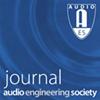Perceptual Significance of Tone-Dependent Directivity Patterns of Musical Instruments
IF 1.1
4区 工程技术
Q3 ACOUSTICS
引用次数: 1
Abstract
Musical instruments are complex sound sources that exhibit directivity patterns that not only vary depending on the frequency, but can also change as a function of the played tone. It is yet unclear whether the directivity variation as a function of the played tone leads to a perceptible difference compared to an auralization that uses an averaged directivity pattern. This paper examines the directivity of 38 musical instruments from a publicly available database and then selects three representative instruments among those with similar radiation characteristics (oboe, violin, and trumpet). To evaluate the listeners’ ability to perceive a difference between auralizations of virtual environments using tone-dependent and averaged directivities, a listening test was conducted using the directivity patterns of the three selected instruments in both anechoic and reverberant conditions. The results show that, in anechoic conditions, listeners can reliably detect differences between the tone-dependent and averaged directivities for the oboe but not for the violin or the trumpet. Nevertheless, in reverberant conditions, listeners can distinguish tone-dependent directivity from averaged directivity for all instruments under study.乐器音调相关指向性模式的感知意义
乐器是一种复杂的声源,其指向性模式不仅随频率而变化,而且还可以随演奏音调而变化。与使用平均方向性模式的听觉化相比,作为播放音调的函数的方向性变化是否导致可感知的差异尚不清楚。本文从一个公开的数据库中检查了38种乐器的指向性,然后从具有相似辐射特性的乐器中选择了三种具有代表性的乐器(双簧管、小提琴和小号)。为了评估听众使用音调相关和平均方向性感知虚拟环境听觉之间差异的能力,在消声和混响条件下,使用三种选定乐器的方向性模式进行了听力测试。结果表明,在无回声条件下,听众可以可靠地检测到双簧管的音调依赖性和平均指向性之间的差异,而小提琴或小号则不能。然而,在混响条件下,听众可以区分所研究的所有乐器的音调相关指向性和平均指向性。
本文章由计算机程序翻译,如有差异,请以英文原文为准。
求助全文
约1分钟内获得全文
求助全文
来源期刊

Journal of the Audio Engineering Society
工程技术-工程:综合
CiteScore
3.50
自引率
14.30%
发文量
53
审稿时长
1 months
期刊介绍:
The Journal of the Audio Engineering Society — the official publication of the AES — is the only peer-reviewed journal devoted exclusively to audio technology. Published 10 times each year, it is available to all AES members and subscribers.
The Journal contains state-of-the-art technical papers and engineering reports; feature articles covering timely topics; pre and post reports of AES conventions and other society activities; news from AES sections around the world; Standards and Education Committee work; membership news, patents, new products, and newsworthy developments in the field of audio.
 求助内容:
求助内容: 应助结果提醒方式:
应助结果提醒方式:


